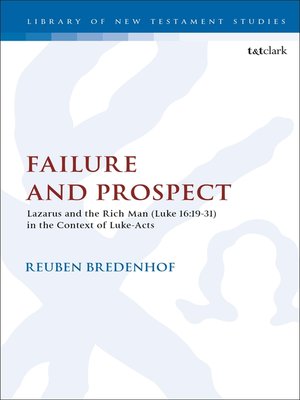Failure and Prospect
ebook ∣ Lazarus and the Rich Man (Luke 16: 19-31) in the Context of Luke-Acts · The Library of New Testament Studies
By Reuben Bredenhof

Sign up to save your library
With an OverDrive account, you can save your favorite libraries for at-a-glance information about availability. Find out more about OverDrive accounts.
Find this title in Libby, the library reading app by OverDrive.



Search for a digital library with this title
Title found at these libraries:
| Library Name | Distance |
|---|---|
| Loading... |
Bredenhof analyses the parable of Lazarus and the Rich Man (Luke 16:19-31) by examining its functions as a narrative, considering its persuasiveness as a rhetorical unit, and situating it within a Graeco-Roman and Jewish intertextual conversation on the themes of wealth and poverty, and authoritative revelation. The parable portrays the consequences of the rich man's failure to respond to the suffering of Lazarus. Bredenhof argues that the parable offers its audience a prospect for alternative outcomes, in response both to poverty and to a person who has risen from the dead.
This prospect is particularly evident when the parable is read in anticipation of the ethical and theological concerns of Luke's second volume in Acts. Bredenhof asserts that reading within the context of Luke-Acts contributes to the understanding of Luke's purposes with this narrative. It is in Acts that his audience witnesses the parable's message about mercy being applied through charitable initiatives in the community of believers, while the Acts accounts of preaching and teaching demonstrate that a true reading of "Moses and the prophets" is inseparably joined to the believing acceptance of one risen from the dead. Through a re-reading of Luke 16:19-31 in its Luke-Acts context, its message is amplified and commended to the parable's audience for their response.
This prospect is particularly evident when the parable is read in anticipation of the ethical and theological concerns of Luke's second volume in Acts. Bredenhof asserts that reading within the context of Luke-Acts contributes to the understanding of Luke's purposes with this narrative. It is in Acts that his audience witnesses the parable's message about mercy being applied through charitable initiatives in the community of believers, while the Acts accounts of preaching and teaching demonstrate that a true reading of "Moses and the prophets" is inseparably joined to the believing acceptance of one risen from the dead. Through a re-reading of Luke 16:19-31 in its Luke-Acts context, its message is amplified and commended to the parable's audience for their response.







